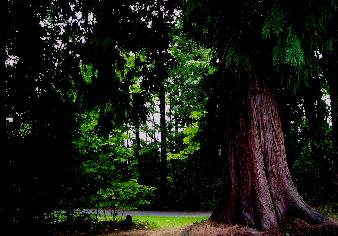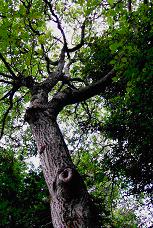This page includes English and Japanese. (Your computer might not recognize the Japanese parts)
Most of these symbols are compounded fundamental characters related to
each total shape:
 (木){
(木){ ,
, plant}: tree (木),
plant}: tree (木),
 {
{ ,
, }: grass (草)
}: grass (草)
 {
{ heart,
heart, ): flower (花),
): flower (花),
 {
{ twine,
twine, }: vine kind of plant
like ivy (蔦など)
}: vine kind of plant
like ivy (蔦など)
 {
{ the zigzag shape (of the leaf),
the zigzag shape (of the leaf), }: fern (シダ)
}: fern (シダ)
 {
{ ,
, move}: reptiles; creep
(with #gd) (爬虫類)
move}: reptiles; creep
(with #gd) (爬虫類)
 {
{ ,
, ,
, air} (wings opened bird shape): bird (鳥)
air} (wings opened bird shape): bird (鳥)
 {
{ ,
, ,
, }: insect (虫)
}: insect (虫)
 {
{ sheet,
sheet,
 main part of 'insect'}: butterfly (蝶)
main part of 'insect'}: butterfly (蝶)
 {
{ relation,
relation, water,
water, air}: amphibian (両生類)
air}: amphibian (両生類)
 {
{ one,
one, cell} (one cell living
thing ): bacteria including some kind of fungi (細菌)
cell} (one cell living
thing ): bacteria including some kind of fungi (細菌)
 {
{ ,{
,{ move,
move, life} animal}: mammal (哺乳動物)
life} animal}: mammal (哺乳動物)
 human, person
(人)
human, person
(人)
 and (conjunction) (そして)
and (conjunction) (そして)
 {
{ the same level,
the same level, life}: sibling/siblings (兄弟姉妹)
life}: sibling/siblings (兄弟姉妹)
 preposition mark to show that the
following words modifies the front word (前置符)
preposition mark to show that the
following words modifies the front word (前置符)
 {
(generation)-before,
{
(generation)-before,  life,
life,  plural )}: children (子どもたち)
plural )}: children (子どもたち)
 {before,
{before, female in this case,
female in this case,
 }: mother (母)
}: mother (母)
*Above two c-cs were changed like them later
from the original pictograph.
 {
{ globe,
globe, the, that}: the earth (地球)
the, that}: the earth (地球)
Forest:
It’s been a long time! I’m glad you look fine.
Yoshiko:
I realized your greatness and power afresh!
Last year I cleaned up the weeds around our house from
the roots as much as I could, but already tall grasses
more than last year cover the house.
Some parts of boards are mossy by rains;
maple sprouts are growing all over, even inside of the gutters.
The roots of ivies and blackberries and also
tunnels dug by wild rats are again filling up in the
underground of the yard.
The rats have turned our basement boiler room into their hotel….
F:
It’s natural because this house was vacant for ten months.
By the way, you are getting much better to use a hoe and a shovel.
Instead of your own power, you are using the energy of earth quite
well.
Y:
Thank you. Now I can use them without much tiredness,
learning through your instruction to contact
with earth
and to catch a peaceful feeling.
Things don’t look changed between yesterday and today,
but nature certainly accumulates little changes all the time.
I got very impressed by this nature power that turns
human ordered things into chaos.
F:
It is you humans that resist and disturb natural laws,
aren’t you?
Following your way, I have used the word, “I” for me,
but actually I feel more appropriate with “We” to express
myself.
Among “Us”, as you know, there are maples, cedars,
cottonwoods, walnuts, ferns, buttercups, morning glories,
squirrels, rats, bats, raccoons, eagles, songbirds, mosses,
lichens, huge amount of bacteria, and more living things.
They all live by each particular way harmonizing with
the rhythm of the earth, relating to each other;
and the totality is “Me/Us.”
Very different personalities get along or stick a balance
with others; or eat others or are eaten by others.
Then I always change as their totality.
If you want to live here, you too should be a member of us,
always being careful to get along with other lives here,
don’t you think so?
Recent years, traffic in the neighboring road are more
and more increasing. It became noisier and the air became dirtier.
The large leaf maples spread their children around that boundary
to protect this entire forest from that suffering by the quick growth
of their large leaves. Don’t you feel it?
Y:
Indeed, we’ve been very selfish!
We are lacking of thoughts for you, the Forest willing to
sustain its creatures; also for each creature’s individual work;
and without becoming a part of the forest,
we’ve wished you being beautiful eternally.
F:
The ancient natives around here were a part of the Forest.
They felt that flowers, grasses and trees were their sisters,
and squirrels, deer and eagles were their brothers,
believing that all lives were children of mother earth.
Then when they think something important,
they usually use “we” for the subject of a sentence,
but not “I,” as “we did/ what should we do?”
widening the viewpoint to get sustainable visions,
not to focus on an individual benefit.
“We” included a variety of personalities, they knew,
and yet everybody recognized that they were children
of mother earth; having the custom to listen to her
since each childhood. Because of this base,
they could be in one large family.
Mother earth is also breathing and alive,
getting energy from the sun, contacting with other universe, too.
Being with her breathing rhythm, her children could be in peace.
Each one tried to live with his/her best,
enjoying harmonizing with other lives and personalities.
Then they peacefully returned into mother earth.
Before such family, new people appeared in great strength;
they were the ones, who didn’t mind to buy/sell Mother Earth,
and to chop off their brothers and sisters in the forest.
The native people couldn’t understand them;
being worried very much.
But they finally obeyed and moved out from this forest
endlessly spread at the time, leaving a speech to the newcomers:
“Sometime in the future, you must listen to the breath
of mother earth. You must hear our spiritual voices
through mountains, grasslands and streams,
which have lived with us for thousands of years,
even if all our people would be extinguished.
Because you also are the children of mother earth,
and are our siblings.” *
However, how many people listen to the breathing
of mother earth?
As I told you before, contacting with earth is an easy thing;
also you can get everlasting peaceful feeling by that way.
But now humans seem to have forgotten it,
seeking transient joy of fulfillment and pleasure with speed.
When contacting with earth, linking with other personalities;
also forgetting about yourself, your heart can be in peace.
Why don’t humans try it?
Why don’t they get their viewpoint out
from each small individual pocket?
Why they continue fighting against their own brothers?
Y:
Hmm, You are usually so calm,
even so you look impatient today…
F:
Yes, we have to appeal it to anyone who listens to us,
before it’s too late.
Once you said that the system of a language could make
its user’s thinking way;
English grammar supports individualism
through the logical rule with the clear subject
centering a human as I/you/he/she, didn’t you?
Can’t Earth Language (EL) sift the English user’s thinking
way?
Y:
Recently I read a book to tell that ancient English
before the era of aggression and invasion needed not always
a subject in a sentence. **
Logical grammar through the objective viewpoint was
developed between different cultures,
and is more developed in the global society, I guess.
They are fussy about the right of individual speech now.
I thought that logical and objective thoughts are important
in EL, too.
Then the EL system is also available to describe in that way.
Also I planned that skipping a subject in a sentence was
possible among close relations….
But not in that negative way, EL might be able to simplify
expressions in more positive way by clearing its common
standard viewpoint! Besides users might be able to share “our”
ideas,
instead of “my” ideas, like the Native American people.
F:
Yes, the communication way to connect four corners of
the earth must be simple.
I knew what the common viewpoint means:
It’s the point from the status as children of mother earth.
Y:
That’s right. Every people of the earth is a child of mother
earth.
Watching Mother, our environment from that point,
they can exchange expressions simply and happily.
For example, you can express a sentence like
“The surface of the sea rose” or “The sky becomes
clean”
as only a predicate verb using three to four EL symbols.
It’s based on the idea that the sea and the sky are common
for us as parts of mother earth.
Also EL has the unique verb system; and things/happenings
can be a subject of a sentence, without the passive voice
for the verb in many cases.
So directly focusing on a thing/phenomenon/event, standing on its side,
we watch and talk with each sense, imagining what each
individual can do for mother earth.
F:
Hmm, The branches and roots of EL also seem to grow
little by little steadily.
But it will be the time to spread wider from now on.
Watch Ivies and Blackberries carefully;
they might be good examples for EL spreading to follow.
Besides extending roots and branches,
they feed birds to carry their seeds far away.
written by Yoshiko McFarland (August
1st, '04)
![]() (木){
(木){![]() ,
, plant}: tree (木),
plant}: tree (木),![]() {
{![]() ,
, }: grass (草)
}: grass (草) {
{![]() heart,
heart, ): flower (花),
): flower (花), {
{![]() twine,
twine, }: vine kind of plant
like ivy (蔦など)
}: vine kind of plant
like ivy (蔦など)![]() {
{![]() the zigzag shape (of the leaf),
the zigzag shape (of the leaf), }: fern (シダ)
}: fern (シダ) {
{![]() ,
, move}: reptiles; creep
(with #gd) (爬虫類)
move}: reptiles; creep
(with #gd) (爬虫類) {
{![]() ,
, ,
,![]() air} (wings opened bird shape): bird (鳥)
air} (wings opened bird shape): bird (鳥)![]() {
{ ,
, ,
, }: insect (虫)
}: insect (虫)![]() {
{![]() sheet,
sheet,
 main part of 'insect'}: butterfly (蝶)
main part of 'insect'}: butterfly (蝶) {
{ relation,
relation,![]() water,
water,![]() air}: amphibian (両生類)
air}: amphibian (両生類) {
{![]() one,
one, cell} (one cell living
thing ): bacteria including some kind of fungi (細菌)
cell} (one cell living
thing ): bacteria including some kind of fungi (細菌)![]() {
{ ,{
,{ move,
move,![]() life} animal}: mammal (哺乳動物)
life} animal}: mammal (哺乳動物)![]() human, person
(人)
human, person
(人) and (conjunction) (そして)
and (conjunction) (そして) {
{ the same level,
the same level,![]() life}: sibling/siblings (兄弟姉妹)
life}: sibling/siblings (兄弟姉妹) preposition mark to show that the
following words modifies the front word (前置符)
preposition mark to show that the
following words modifies the front word (前置符)![]() {
(generation)-before,
{
(generation)-before, ![]() life,
life,  plural )}: children (子どもたち)
plural )}: children (子どもたち)![]() {before,
{before, female in this case,
female in this case,
![]() }: mother (母)
}: mother (母)![]() {
{ globe,
globe, the, that}: the earth (地球)
the, that}: the earth (地球)
 During July, I was away from computing,
During July, I was away from computing, 
 Reference:
Reference: